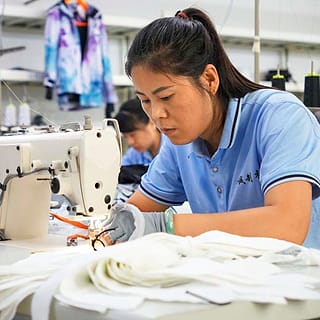Navigating the maze for safe and fair production
We want to ensure that anyone who stitches, designs, dyes or contributes to making one of our garments, does so in a safe environment that treats them fairly and with respect.

Working with suppliers and industry partners, we've made significant strides in achieving better working environments in recent years. But given a complex, global supply chain, we know delivering on this commitment is easier said than done.
Why so complicated?
We have seven Tier 1 suppliers (i.e. garment producers directly supplying a final product to us) responsible for sewing together our clothes. But when we add in Tier 2, Tier 3 and Tier 4 suppliers who produce the individual parts for the clothes, our footprint gets much larger with factories across the globe in locations such as China, Taiwan, Greece and Portugal.
And this geographical spread means suppliers use different tools and platforms to report on working conditions. The labyrinth of different tools and platforms includes SEDEX, SMETA, BSCI, Higg FEM and more – each one with its own set of rules, definitions and ways to measure an issue such as ‘fair working hours’.
That makes it very complicated to mix and match data.
Traversing forward
So, while we always had a strong focus on making sustainable choices regarding suppliers and factories, it was in 2021 that we started to move at pace on this issue. That’s when we found a superhero partner in Leadership & Sustainability (L&S) to help us navigate the maze of suppliers and reporting methods.
Founded by TED speaker Karin Ekberg, L&S enabled us to consistently rate and compare the factories to each other on social performance by exploring the intricacies of the most prevalent auditing systems and evaluation methodologies.

They helped us create a tailored system, built for us, to evaluate these diverse certifications and score them on an A-E scale, thus enabling a fair and consistent assessment of all suppliers.
The system also has X-Ray vision – digging deep into audit reports to bring to light information that might otherwise stay hidden.
We had always looked for suppliers that adopted the Amfori BSCI (Business Social Compliance Initiative) Code of Conduct - which upholds core principles such as fair remuneration, no child labour, freedom of association, decent working hours and environmental protection. And all our suppliers have signed up to the Code.
L&S helped us build on this baseline by giving us the ability to measure progress, compare and follow up where we saw gaps or areas of improvement.
Our Code of Conduct
Freedom of association & Collective bargaining
Workers should have the right to form unions in a free and democratic way and to bargain collectively.
No discrimination
No workers irrespective of gender, race, religion or any other characteristic should be treated differently than others.
Fair remuneration
Workers should receive wages sufficient to provide a decent living for themselves and their families - Minimum mandatory minimum wages.
Decent working hours
Working hours should adhere to laws and ILO agreements with a maximum of 48 hours per week. Overtime should be an exception.
Occupational health and safety
Work environment should comply with health and safety regulations.
No child labour
No children should be employed under the legal school age or less than 15 years old.
Special protection for young workers
Young workers should be protected especially against health, safety and moral.
No precarious employment
Workers should have written contracts complying with national legislation.
No bonded labour
No workers should work unfreely or against his/her own will.
Protection of the environment
Environmental degradation should be avoided.
Ethical business behavior
No corruption should take place.
Results so far
In 2022, we conducted an inaugural supply chain assessment for all Tier 1 and Tier 2 suppliers (such as fabric and yarn producers), and then actively collaborated with factories to address any areas for improvement revealed in the assessment. A second assessment this year (2023) revealed notable progress in addressing corrective actions and also expanded to encompass Tier 3 and 4 suppliers (e.g. fibre producers).

It’s encouraging that over half of those evaluated in 2023 scored an ‘A’ or ‘B’ in our social evaluation, and we will continue to engage and learn to drive up this performance year-on-year through the corrective actions highlighted in each assessment.
Our collaboration with the certification system bluesign® has also yielded substantial enhancements in our supply chain, with 61% of our suppliers bluesign® APPROVED at the time of writing. We are committed to increasing the percentage of bluesign® APPROVED suppliers in the coming years.
Nothing beats human contact

No matter how good our systems and auditing process get, building close and long-lasting relationships with our suppliers will always be the cornerstone of our approach to ensuring fair working conditions.
Getting deep into our suppliers’ operations, including regular factory visits and week-to-week contact on workflow and operations give us the knowledge to actively support our suppliers in maintaining high levels of worker security and rights. We have deep relationships with all our top suppliers including the likes of Yantai on China’s East Coast who we have worked with for over ten years.
What's next?
It’s been a long path to get all our suppliers assessed consistently and effectively on social issues, and our focus is now on addressing the corrective actions revealed for all sites by those audits.
We will continue to work tirelessly and proactively to improve these results, ensuring the highest standard of working conditions possible for all team members throughout our supply chain.